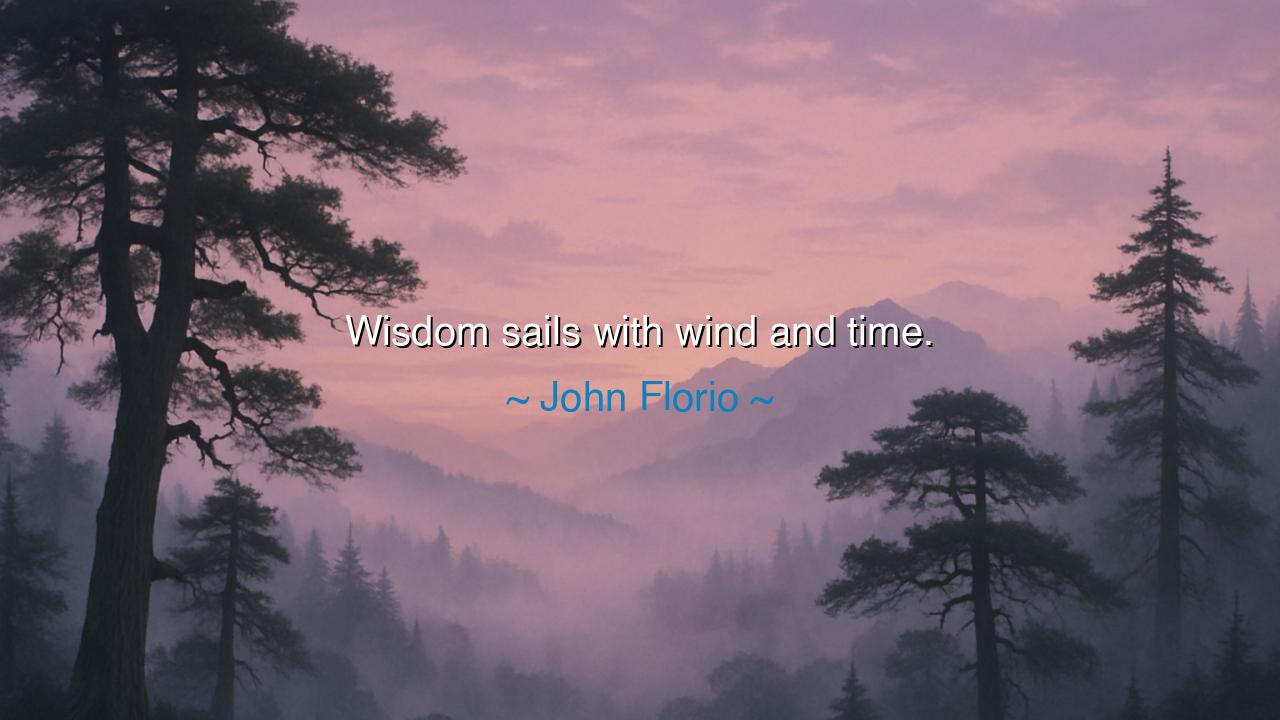
Wisdom sails with wind and time.






Wisdom, like a great ship upon the sea, does not move by strength alone. When John Florio, the Renaissance thinker and translator, declared, “Wisdom sails with wind and time,” he revealed a truth about the journey of understanding. Just as a vessel cannot cross the ocean without the guiding wind and the patient passage of time, so too does wisdom require the forces of experience and the seasons of life to reach its destination. Knowledge may be gathered swiftly, but wisdom is carried slowly, borne on the currents of trial, failure, and growth.
At the heart of Florio’s words is the idea that wisdom cannot be rushed. A ship that sets out too hastily without waiting for the wind will founder. Likewise, those who seek to be wise overnight will only gather fragments of truth, untempered by reflection. Wind symbolizes opportunity—the moments in life that propel us forward, whether through challenges or blessings. Time represents patience, for no voyage is complete in a single day. Only when these two forces converge can the soul travel toward true understanding.
History provides many examples of this timeless principle. Consider Marcus Aurelius, the philosopher-emperor of Rome. His Meditations, now revered as works of deep wisdom, were not written in youth or haste. They were shaped over decades of ruling an empire, facing wars, betrayals, and personal losses. Each hardship was a gust of wind that moved his ship forward, and the years themselves were the sea upon which his thoughts sailed. His writings endure because they were born of time and experience, not mere intellect.
Conversely, those who reject this truth often fall into ruin. Many leaders throughout history, driven by youthful ambition and impatience, have tried to seize power or knowledge too quickly. Napoleon Bonaparte, though brilliant, rose so fast that he believed himself invincible. His lack of patience and his refusal to heed the winds of caution led to disastrous campaigns, like the invasion of Russia. His fall was a reminder that wisdom cannot be forced; it must be allowed to unfold with the rhythm of life itself.
Florio’s metaphor also applies to the personal journeys of ordinary people. A young person may possess intelligence, yet without the passage of time, their understanding remains shallow. It is through the winds of love and loss, triumph and failure, that the soul matures. When one looks back across decades, the seemingly chaotic storms of life reveal themselves as the very forces that carried the ship of wisdom to safe harbor. Patience, therefore, is not merely waiting—it is trusting that every moment of the voyage has purpose.
Let this lesson endure through the ages: wisdom is not a destination, but a voyage. As John Florio teaches, it moves only when the winds of opportunity meet the slow, steady passage of time. To rush the journey is to sink beneath the waves, but to trust in the winds and the seasons is to sail with grace toward understanding. May all who seek wisdom remember that every trial, every year, and every quiet moment upon the sea of life brings them closer to the distant shores of truth.






AAdministratorAdministrator
Welcome, honored guests. Please leave a comment, we will respond soon